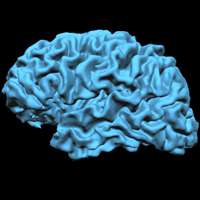January 14, 2014 report
Study suggests teen brain is more sensitive to rewards than adult brain

(Medical Xpress)—Emily Barkley-Levensona and Adriana Galvána, psychology researchers at the University of California have conducted a study which indicates that teen brains, as suspected, truly are more sensitive to rewards than the adult brain. In their paper they've had published in Proceedings of the National Academy of Sciences, the two describe experiments they conducted with teen and adult volunteers playing betting games while undergoing MRI scans.
Many studies have been done that back up what parents have been claiming for years, namely, that teen brains react differently to a rewarding stimulus, in general, than do adult brains—in short, they tend to react more strongly. One problem with testing such a claim in the lab, however, the researchers in this effort point out, is that many such tests are based on the use of money as a stimulus. The problem with that is that teens may value money more than adults as a general rule because they have less of it. Thus, to truly learn if the teen brain is more sensitive to reward stimuli, a means must be found to factor out such a possibility.
In their study, the research duo enlisted the assistance of nineteen healthy adult and twenty two healthy teen volunteers of both genders. Each was asked to participate in gambling games as they underwent MRI scans. The gambling games were based on monetary rewards, but to prevent the perceived value of money itself from exerting undue influence, the researchers explained that all monetary transactions would be quite small, that all participants would be given the same amount of initial capital, and that potential winnings would be no more than $20.
The gambling game itself consisted of making bets on outcomes that had a 50/50 change of winning or losing, thus no skill was involved. Volunteers were able to bet whatever amount they chose so long as they could cover it with the cash they were given.
As the volunteers played the betting games, the researchers watched activity levels in parts of the volunteers' brains known to be involved in responding to positive stimulation (the ventral striatum, etc.). The researchers noted more activity in such areas in the brains of the teens than in the adults as the betting transpired. They also noted that teens tended to risk more with their betting.
The results of their experiment suggests, the researchers report, that teen brains truly are wired differently than are adult brains and as a result are more sensitive to rewards.
More information: "Neural representation of expected value in the adolescent brain," by Emily Barkley-Levenson and Adriana Galván. PNAS, www.pnas.org/cgi/doi/10.1073/pnas.1319762111
© 2014 Medical Xpress














